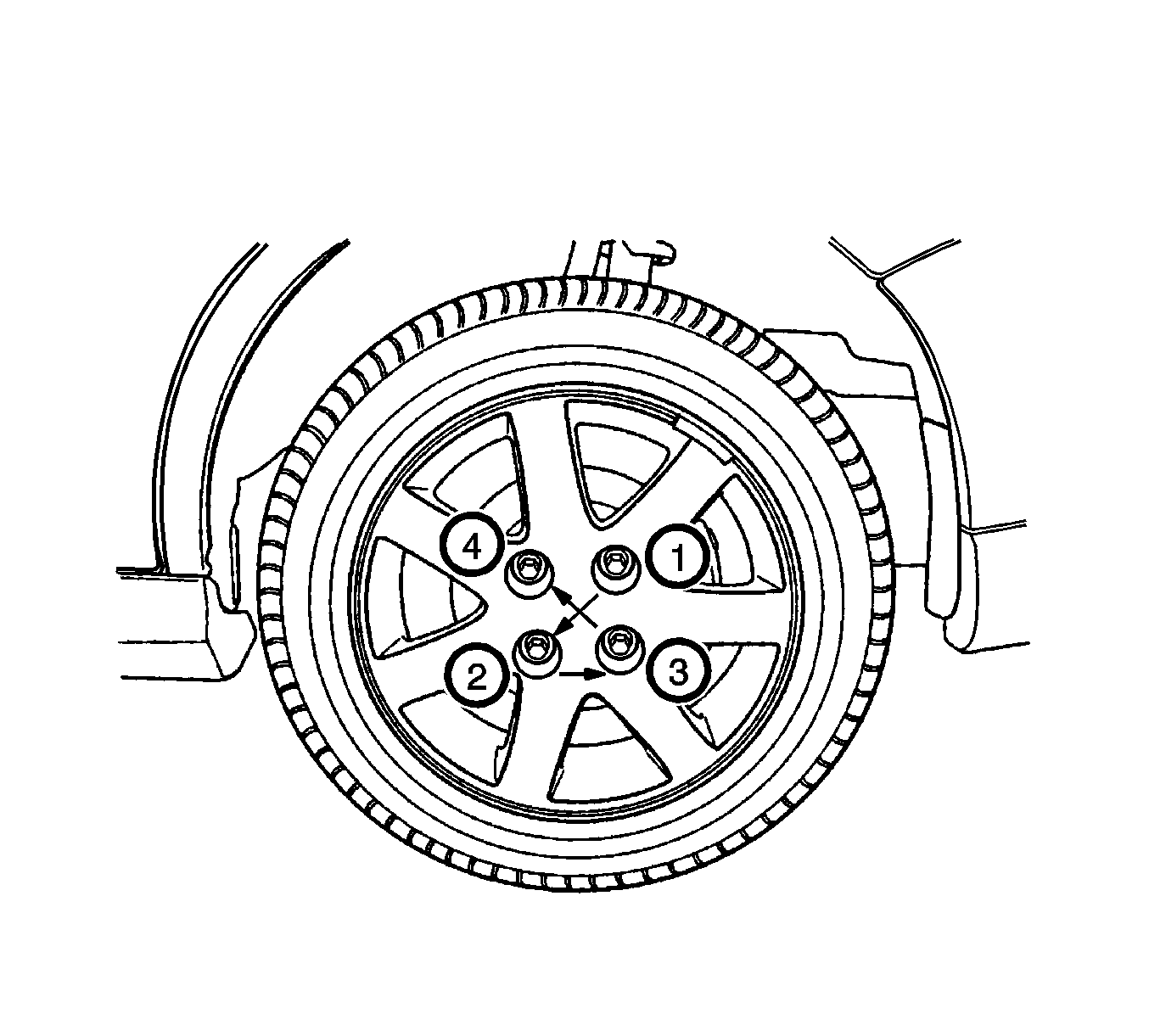Removal Procedure
- Raise and support the vehicle. Refer to
Lifting and Jacking the Vehicle.
- Remove the wheel cover, if equipped.
- Remove the wheel center cap, if equipped.
- Remove the wheel nut caps, if equipped.
- Mark the relationship of the wheel to the hub.

- Remove the wheel nuts (1, 2, 3, 4).
Warning: If penetrating oil gets on the vertical surfaces between the wheel and the rotor or drum, it could cause the wheel to work loose as the vehicle is driven, resulting in a loss of control and an
injury accident. Never use heat to loosen a tight wheel. It can shorten the life of the wheel, studs or hub and bearing assemblies. Wheel nuts must be tightened in sequence and to the proper torque to avoid bending the wheel or brake rotor or drum.
Caution: Removing the wheel may be difficult because of foreign materials or a tight fit between the wheel and the hub/rotor. Slightly tap the tire side wall with a rubber mallet in order to remove
the wheel. Failure to follow these instructions may result in damage to the wheel.
Caution: Never use heat to loosen a tight wheel. It can shorten the life of the wheel, studs, or hub and bearing assemblies. Wheel nuts must be tightened in sequence and to the specified torque to avoid
bending the wheel or rotor.
- Remove the tire and wheel assembly from the vehicle. If the tire and wheel assembly is difficult to remove, perform the following steps:
| 7.1. | Install and tighten all wheel nuts on the affected wheel. |
| 7.2. | Loosen each wheel nut two turns. |
| 7.4. | Rock the vehicle from side to side. |
| 7.5. | Repeat this procedure if necessary. |
- If the tire and wheel assembly still does not loosen, perform the following steps:
| 8.2. | Drive the vehicle forward and rearward slightly while applying quick, hard jabs of the brakes prior to changing direction. |
| 8.3. | Repeat this procedure if necessary. |
Installation Procedure
Warning: Before installing the wheels, remove any buildup of corrosion on the wheel mounting surface and brake drum or disc mounting surface by scraping and wire brushing. Installing wheels with poor metal-to-metal
contact at the mounting surfaces can cause wheel nuts to loosen. This can cause a wheel to come off when the vehicle is moving, causing loss of control and possibly personal injury.
Note: If the vehicle is equipped with directional tread tires, ensure that the directional arrow on the outboard side of the tire is pointed in the direction of forward tire rotation prior to installation on the vehicle.
- Remove any corrosion or foreign material from the wheel and the hub mounting surfaces.
- Clean the threads on the wheel studs and wheel nuts.
- Align the reference mark and install the tire and wheel assembly to the hub.
Caution: Refer to Fastener Caution in the Preface section.

Note: Tighten the nuts evenly and alternately in order to avoid excessive runout of the tire and wheel assembly.
- Install the wheel nuts (1, 2, 3, 4) and tighten to
110 N·m (81 lb ft).
- Install the wheel nut caps, if equipped.
- Install the wheel center cap, if equipped.
- Install the wheel cover, if equipped.
- Lower the vehicle.


